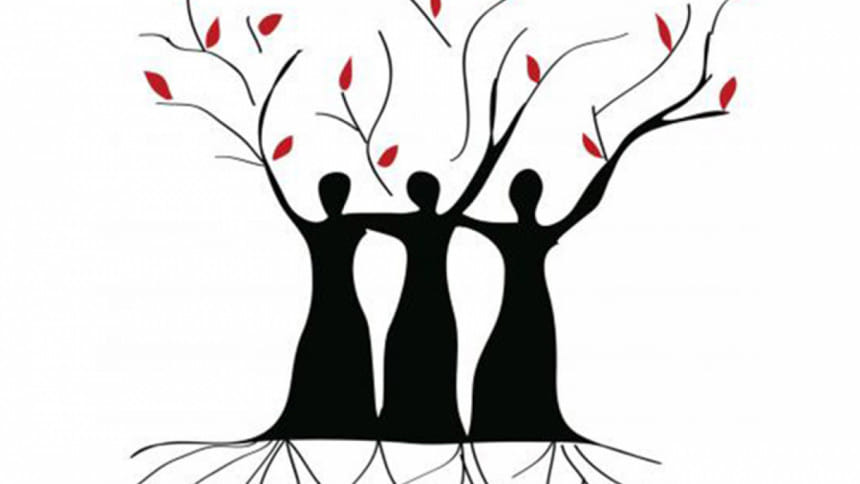Let girls grow up as equal citizens

For the last few days, I have been thinking of a group of adolescent girls (studying in high school) whom I met in a char of Lalmonirhat district several years ago. It has been profoundly inspiriting to note their determination to continue education even when they had to face so many challenges. Walking for two hours each way to and from school was their usual practice. During rainy season, they had to take a boat to attend classes. Still they did not want to miss the opportunity of accessing education.
I got to know that most of their classmates have already dropped out due to child marriage and their parents may also arrange marriages for them anytime. That was their biggest anxiety. The girls shared that if they could complete school they would offer to teach younger students to earn money, and thus it would be possible to attain a college degree.
Some of the girls were involved in a child club (facilitated by an NGO), and were creating awareness against child marriage in the community. I have been thinking about the situation they will face now after the Child Marriage Restraint Act 2017 has been passed with the special circumstances provision. Due to this, children may be married off below the minimum age (18 for girls and 21 for boys) with permission from the court and consent of their parents/guardians if it is deemed to be "in the best interest of an underage female or male."
Now if the girls of the char of Lalmonirhat want to stop the marriage of a girl below 18 years, they will not have very strong arguments; if parents/guardians consider that the marriage will protect the best interest of the child then it is legal. Due to my professional work, I have the privilege of meeting hundreds of adolescent girls from all parts of Bangladesh including remote rural areas and urban slums. They are united in their resolve to continue education and fear the risk of being married off at a young age due to parental decision. After passing of the law it seems to me we have collectively failed the girl children of our country.
We know enforcement of law is a challenge in Bangladesh. But it is critical to have the right legal framework. Why are we concerned about the Child Marriage Restraint Act 2017? The special circumstances provision is left wide open. "The best interests of a child" and "special circumstances" have not been defined clearly. There is no minimum age for the provision, which is extremely alarming.
Moreover, children have a right to express views regarding decisions that affect their lives. The provision is a clear violation of children's right to participation, as their views will not be sought when they are being married off. It is worth noting that almost all child marriages in our country happen as a result of the decisions taken by parents/guardians.
Presently, many parents obtain fake birth registration certificates for their children in order to "comply" with the legal age of marriage. It is possible to imagine what will happen when there is a provision legally allowing marriage below the minimum age. We are concerned the provision will be misused, which will lead to an increase in child marriage in Bangladesh.
The provision may also encourage sexual violence against girls because there will be no penalties against the perpetrators.
The special circumstances provision conflicts with the United Nations Convention on the Rights of the Child and Children Act 2013 of Bangladesh. If enforced, the law will be a serious setback for the empowerment of girls and women and reverse the hard won progress in education, health as well as economic, social, and political participation. There will be long-term negative impact on the overall progress of the nation. Can we let that happen?
Some of us have been involved in initiatives against the provision over the last three years. During that period, I have been extremely disturbed with the rationale given to justify the special circumstances provision. Unwanted pregnancy has been repeatedly mentioned as a reason for underage marriage. If a girl becomes pregnant due to rape then marrying her off with the rapist can never be a solution.
The perpetrator must be brought to justice, which will deter future offenders. It is our responsibility to ensure an environment where girls can grow up to realise their full potential.
There should be capacity development of children, parents, teachers, community members so that children can be protected from all forms of violence and abuse. We must establish a functional child protection system in order to prevent and respond to all forms of violence against children, which includes sexual violence. That is mandated through Children Act 2013.
I had the opportunity to attend a public hearing on law reform in Thailand several months ago. It was so encouraging to note that the government of Thailand has taken initiative to increase the minimum age of marriage to 18 years (presently it is 17 years).
The public hearing gave a space to representatives from academia and civil society to express their views. Several other countries have increased the minimum age of marriage to 18 years. While observing the event in Bangkok, I asked myself: can we be proud of our economic progress if we force our children into marriage because we have failed to create an environment where they are protected from violence, abuse, and exploitation. Why are we going backwards?
Due to social acceptance of child marriage the rate is so high, even though we have had Child Marriage Restraint Act since 1929. According to a national survey, 64 percent of all Bangladeshi women aged 20-24 were married before the age of 18. Gender inequality is one of the root causes of child marriage.
Society places disproportionate emphasis on women's reproductive and caring roles. In most cases, parents do not treat boys and girls equally, and they have very limited aspirations for academic or professional achievements of their daughters. The special circumstances provision and the associated justification given will reinforce the gender stereotypes, and will be misused by parents who consider that a woman's life should revolve around marriage.
During a mass gathering at the Shaheed Minar in January this year, adolescent girls protested against the special circumstances provision along with other child and human rights activists. They displayed messages, one of which mentioned, "No to child marriage; we want to be equal citizens." Are we doing enough to ensure that our girls can grow up as equal citizens?
The writer is Director of Child Protection, Save the Children.

 For all latest news, follow The Daily Star's Google News channel.
For all latest news, follow The Daily Star's Google News channel. 



Comments